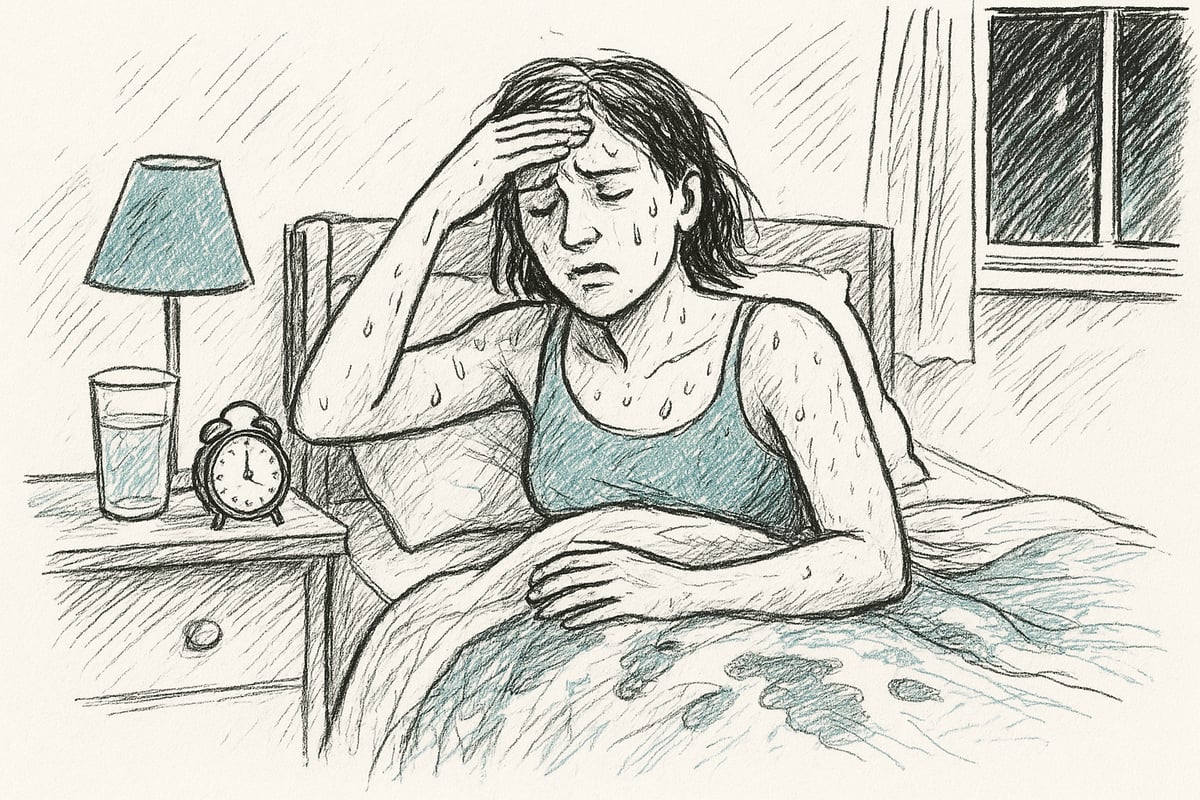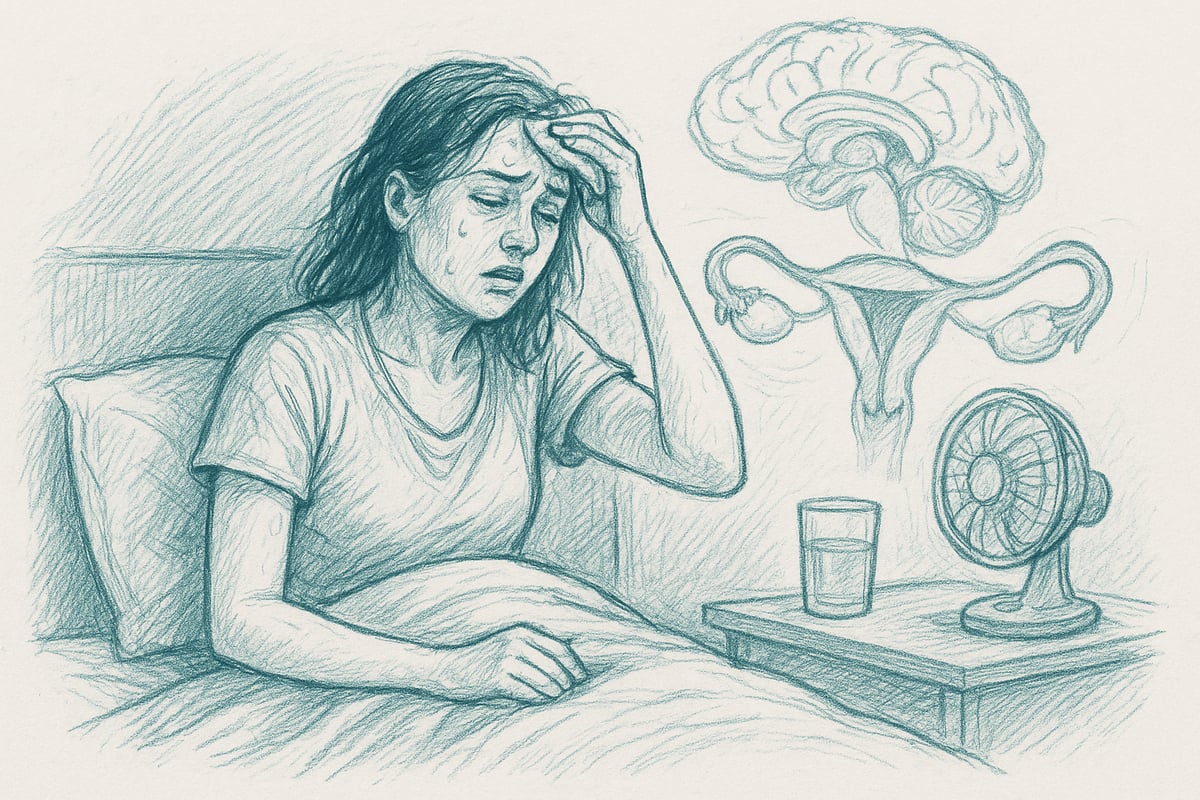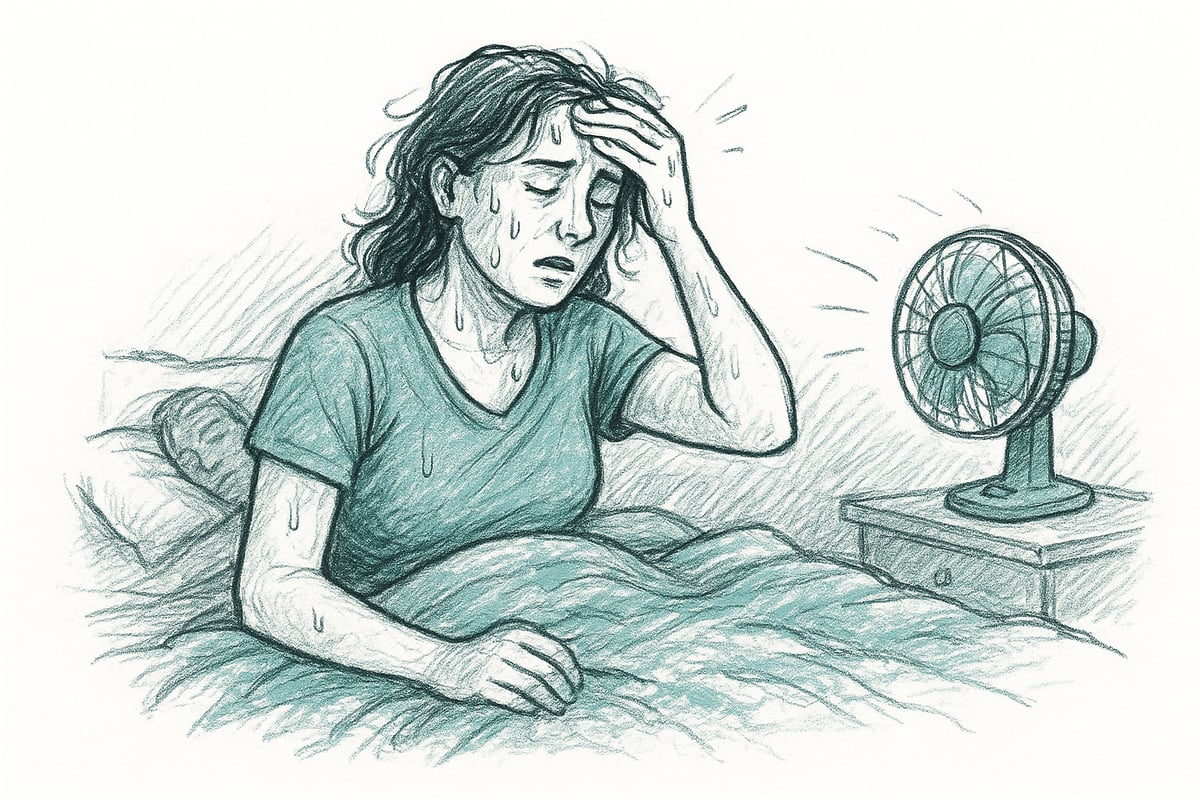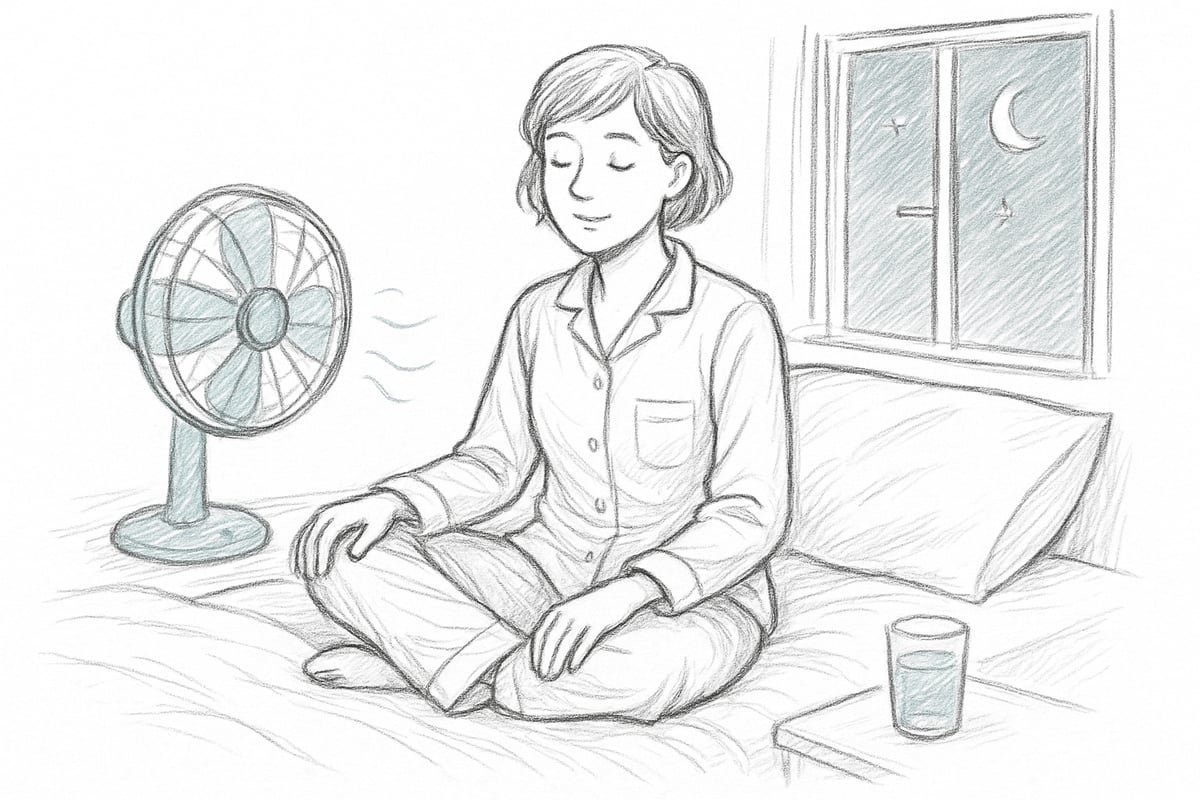Discover the causes and management of ovarian cancer night sweats Learn symptoms, treatment effects, and expert tips to improve comfort and quality of life
Waking up drenched in sweat can be both distressing and confusing, especially for those dealing with ovarian cancer night sweats. Many people find themselves searching for answers, wondering why these uncomfortable symptoms are happening and how to regain restful sleep.
This guide is here to demystify ovarian cancer night sweats, offering trusted information and practical strategies for managing them effectively. You'll learn what night sweats are, why they occur in ovarian cancer, how to tell them apart from similar symptoms, and what role treatments may play.
We’ll also explore management techniques and share where to find reliable support. By understanding the link between ovarian cancer night sweats and your health, you can take confident steps toward feeling better and improving your quality of life.
Night sweats are episodes of intense sweating that occur while you sleep, often so severe that your nightwear or bedding becomes soaked. For those experiencing ovarian cancer night sweats, these episodes are far beyond what you’d expect from simply being too warm or having a heavy duvet.
Unlike normal sweating, which might happen after exercise or in a hot room, ovarian cancer night sweats happen independently of room temperature. They can strike suddenly, even in a cool environment. The key difference is the disruption they cause to your rest and comfort.
Common symptoms of ovarian cancer night sweats include:
| Symptom | Night Sweats (Ovarian Cancer) | Normal Sweating |
|---|---|---|
| Timing | During sleep | Any time |
| Severity | Often soaks clothes/bedding | Mild to moderate |
| Associated symptoms | Chills, palpitations, fatigue | Usually none |
| Impact on daily life | High (sleep disruption) | Low |
The frequency and severity of ovarian cancer night sweats can vary. Some people may have them every night, while others experience them only occasionally. For many, the unpredictability adds to the distress, as it’s hard to know when a bad night might strike.
Sleep quality can suffer dramatically. Regular sleep disruption may lead to daytime fatigue, lack of concentration, and a dip in mood. It’s not just physical discomfort, but emotional strain as well. One patient shared on a support forum, “I wake up at 2am, drenched, shivering, and wide awake. It’s exhausting, and I never feel fully rested.”
Statistics show that up to 80% of women dealing with hormonal changes, such as those caused by menopause or cancer treatment, report night sweats. This means ovarian cancer night sweats are a very common challenge for many.
If you’d like to understand more about the symptoms, causes, and management options, the Hot Flashes and Night Sweats (PDQ®) guide from the National Cancer Institute offers trusted, in-depth information.
Ovarian cancer night sweats are more than a minor inconvenience. They can impact every aspect of daily life, from sleep to self-confidence. Recognising the symptoms is the first step toward managing them effectively.

The reasons behind ovarian cancer night sweats can be complex, involving a mix of hormonal, physiological, and disease-specific factors. For many women, these episodes are distressing, often arriving unexpectedly and disrupting rest. Understanding what triggers these night sweats is an important step towards managing them effectively.

Hormonal imbalance is a primary contributor to ovarian cancer night sweats. Ovarian cancer often disrupts the production of oestrogen and progesterone, hormones crucial for regulating body temperature. When their levels drop, it can confuse the body's internal thermostat, leading to sudden bursts of sweating at night. This hormonal shift is similar to what many women experience during menopause, but can be much more abrupt and severe in the context of ovarian cancer.
The tumour itself can also influence body temperature regulation. As ovarian cancer progresses, it may interfere with the hypothalamus, the part of the brain responsible for managing heat and cold signals. The hypothalamus may misinterpret normal body cues, prompting sweat even when the body is not actually overheated. This process can make ovarian cancer night sweats more persistent or intense than typical sweating episodes.
Night sweats can sometimes appear early in the course of ovarian cancer, acting as a warning sign before other symptoms become obvious. Statistics suggest that a significant proportion of women with ovarian cancer report night sweats at some point during their diagnosis or treatment. The frequency and severity of these episodes may increase as the disease advances, making it important to monitor any changes and discuss them with a healthcare provider.
Not every woman with ovarian cancer will experience night sweats in the same way. Some may notice only occasional episodes, while others find them a daily challenge. Factors like tumour size, individual hormone levels, and the body's unique response to cancer all play a role. Evidence-based approaches for understanding and managing these symptoms in gynaecological cancer survivors are discussed in resources such as Menopause in Gynecologic Cancer Survivors: Evidence for Decision-Making, which can help patients and clinicians find tailored solutions.
Waking up drenched, shivering, and exhausted is a reality for many living with ovarian cancer night sweats. These episodes can make it nearly impossible to get a restful night’s sleep, leaving you feeling drained before the day even begins. Sleep disruption is one of the most common complaints, with many describing the frustration of constantly waking to change clothes or bedding.
The emotional impact of ovarian cancer night sweats can be just as challenging. Repeated nights of poor sleep often lead to irritability, anxiety, and sudden mood changes. It’s not uncommon to feel overwhelmed or discouraged, especially when fatigue lingers day after day. Many women share feelings of isolation, wondering if anyone else truly understands how disruptive these symptoms can be.
Physically, ovarian cancer night sweats take a toll on the body. The combination of damp skin, chills, and dehydration can cause discomfort throughout the night. Some people notice skin irritation or even rashes from frequent sweating. Fatigue from ongoing sleep loss can make it difficult to concentrate or stay productive during the day, impacting work and daily routines.
Relationships can also be affected by ovarian cancer night sweats. Partners may be woken up throughout the night, which can strain even the strongest bonds. Family members might express concern or frustration, especially when sleep deprivation begins to affect your mood or ability to participate in activities. Support group members often share stories of negotiating sleeping arrangements or feeling guilty about the impact on loved ones.
Here’s a quick look at how common sleep disruption is among cancer patients experiencing night sweats:
| Symptom | Reported by Cancer Patients |
|---|---|
| Sleep disturbance | Up to 70% |
| Fatigue | Over 60% |
| Mood changes | Over 50% |
One member of an ovarian cancer support forum shared, “It’s not just the sweating, it’s how tired and low I feel the next day that makes everything harder.” Over time, chronic sleep loss and persistent symptoms can affect your immune system, memory, and overall health.
If you’re struggling with these challenges, it’s important to know that you’re not alone. There are practical ways to improve daily wellbeing and reclaim comfort. For more strategies on improving life while managing symptoms like ovarian cancer night sweats, visit Enhancing quality of life during cancer.

Managing ovarian cancer night sweats can feel overwhelming, but practical strategies can make a real difference. Addressing these symptoms starts with understanding what works for you, then building a toolkit of techniques to improve comfort and sleep.

Start with these essential steps:
Lifestyle and Environment Adjustments
Making changes to your daily routine can help minimise ovarian cancer night sweats:
Quick Comparison Table: Night Sweat Comfort Aids
| Solution | Benefit |
|---|---|
| Cooling pillow | Reduces head and neck heat |
| Moisture-absorbing sheets | Keeps bedding dry |
| Fan or air conditioning | Lowers room temperature |
| Light pyjamas | Prevents overheating |
Medication Review
Ask your doctor to review all medications, as some can make ovarian cancer night sweats worse. Adjustments or alternatives might help reduce symptoms.
Step-by-Step: Creating a Sleep-Friendly Environment
Useful Resource
For more tips on coping with sleep disruption and improving overall wellbeing, explore the Cancer health and wellbeing guide, which offers practical advice for those living with ovarian cancer night sweats.
Balancing comfort, lifestyle, and emotional wellbeing is key to managing ovarian cancer night sweats. Small changes can bring big relief, so take it one step at a time.
Not every episode of ovarian cancer night sweats is a cause for alarm, but it is crucial to know when to contact your healthcare provider. Some changes in your symptoms could signal an underlying issue that needs prompt attention.
Night sweats can sometimes be a sign of infection, which is especially important for people undergoing cancer treatment. If you notice your ovarian cancer night sweats becoming much more severe, frequent, or different from your usual pattern, take note.
Watch for these warning signs alongside night sweats:
If any of these symptoms appear with your ovarian cancer night sweats, contact your oncology team right away. They may want to assess you for infection or check if your medications are contributing. For example, certain treatments can lower your immunity, making infections more likely. You can learn more about these risks in the Chemotherapy side effects explained resource.
Your oncology team might recommend blood tests, scans, or a review of your hormone levels to find the cause. Sometimes, adjusting your treatment plan or switching medications helps ease symptoms.
Imagine waking up drenched in sweat for several nights, then noticing a fever and feeling much more tired than usual. In this scenario, it's important to reach out to your medical team promptly. Trust your instincts—if something feels wrong or your symptoms change suddenly, seek advice without delay.
Staying alert to changes in ovarian cancer night sweats and knowing when to seek help can protect your health and support your recovery.
Understanding ovarian cancer night sweats can feel overwhelming, but staying informed is one of the most powerful tools you have. Reliable knowledge helps you recognise symptoms, ask the right questions, and feel confident in your care decisions.
You do not have to navigate this journey alone. Trusted sources like the NHS and Cancer Research UK offer up-to-date information about ovarian cancer night sweats and related symptoms. For practical guidance on managing menopause-related symptoms, including night sweats, you might find Managing Menopause Hot Flashes After Ovarian Cancer Treatment especially helpful.
Keeping a symptom journal is a simple yet effective way to track patterns and share changes with your healthcare team. Recording when night sweats occur, their severity, and any triggers can support more tailored treatment and prompt interventions if symptoms change.
Empowerment also comes from speaking up about how you feel. Advocacy means making sure your concerns are heard and your needs are met. Do not hesitate to reach out to your oncology nurse or doctor with questions about ovarian cancer night sweats or any new developments.
Building a support network can make a real difference. Family, friends, and peer communities provide emotional backing and practical advice. Many women say that connecting with others who understand their experience leaves them feeling less isolated and more hopeful.
Being proactive and informed leads to better outcomes and a higher quality of care. Remember, knowledge is your ally on this journey.
Understanding ovarian cancer night sweats can feel overwhelming, but remember, you’re not alone on this journey. We’ve explored what causes night sweats, how they impact your daily life, and practical ways to manage them—because having the right knowledge truly makes a difference. If you’re looking for even more support, trusted information, or just someone who understands, Cancer Care Parcel is here for you. We believe everyone deserves compassion and clarity, especially at challenging times. For more ways to feel informed and empowered, take a look at Our Story—we’re in this together, every step of the way.

In a world full of conflicting and sometimes misleading information about cancer, Cancer Care Parcel stands out by offering resources backed by solid facts. Funded entirely by the sale of our products and donations, we ensure that every resource on our site is accurate, trustworthy, and focused on supporting the cancer community.
Founded by Dr Shara B.A. Cohen, PhD, CBiol, FWIF, FRCPath, FIBMS, FRSB, BEM, Cancer Care Parcel provides trusted information, a freebies directory, and a library of live and on-demand webinars for patients, families, and caregivers. The organisation also gives away free care packages to those in need, made possible through the generosity of donors and supporters. Every purchase or contribution helps us deliver comfort, education, and a sense of calm to people affected by cancer.
Read 5 Simple Tips To Help You Gather Together A Great Cancer Care Team, From The People That You Know, To Help You Get The Support You Need.
Learn How To Write A Successful Cancer Blog, Share Your Journey, And Inspire Others. Discover Tips For Creating Engaging, Impactful Content And Building Community.
As a married mum of 2 young girls, it’s sad to say that we have nursed two of our parents through cancer.